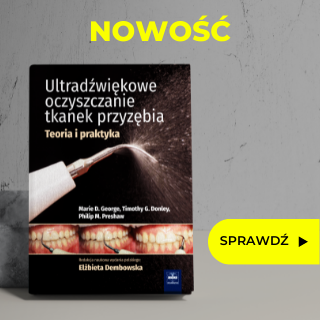Dostęp do tego artykułu jest płatny.
Zapraszamy do zakupu!
Po dokonaniu zakupu artykuł w postaci pliku PDF prześlemy bezpośrednio pod twój adres e-mail.
STOMATOLOGIA PRAKTYCZNA
Opis przypadku
Leczenie bezzębia z wykorzystaniem protezy typu overdenture na implantach w żuchwie – opis przypadku
Tomasz Borowczyk, Adam Polcyn
-
Geckili O, Bilhan H, Mumcu E i wsp. Comparison of patient satisfaction, quality of life, and bite force between elderly edentulous patients wearing mandibular two implant-supported overdentures and conventional complete dentures after 4 years. Spec Care Dentist. 2012; 32(4): 136-141.
-
Celebić A, Knezović-Zlatarić D, Papić M i wsp. Factors related to patient satisfaction with complete denture therapy. J Gerontol A Biol Sci Med Sci. 2003; 58(10): M948-M953.
-
Assunção WG, Zardo GG, Delben JA i wsp. Comparing the efficacy of mandibular implant-retained overdentures and conventional dentures among elderly edentulous patients. Satisfaction and quality of life. Gerodontology. 2007; 24(4): 235-238.
-
Sharma AJ, Nagrath R, Lahori M. A comparative evaluation of chewing efficiency, masticatory bite force, and patient satisfaction between conventional denture and implant-supported mandibular overdenture. An in vivo J Indian Prosthodont Soc. 2017; 17(4): 361-372.
-
van de Rijt LJM, Stoop CC, Weijenberg RAF i wsp. The influence of oral health factors on the quality of life in older people. A systematic review. Gerontologist. 2020; 60(5): e378-e394.
-
de Souza Batista VE, Verri FR, Lemos CAA i wsp. Should the restoration of adjacent implants be splinted or nonsplinted? A systematic review and meta-analysis. J Prosthet Dent. 2019; 121(1): 41-51.
-
Müller F, Duvernay E, Loup A i wsp. Implant-supported mandibular overdentures in very old adults. A randomized controlled trial. J Dent Res. 2013; 92(12 Suppl): 154S-160S.
-
Harris D, Höfer S, O’Boyle CA i wsp. A comparison of implant-retained mandibular overdentures and conventional dentures on quality of life in edentulous patients. A randomized, prospective, within-subject controlled clinical trial. Clin Oral Implants Res. 2013; 24(1): 96-103.
-
Awad MA, Rashid F, Feine JS i wsp. The effect of mandibular 2-implant overdentures on oral health-related quality of life. An international multicentre study. Clin Oral Implants Res. 2014; 25(1): 46-51.














